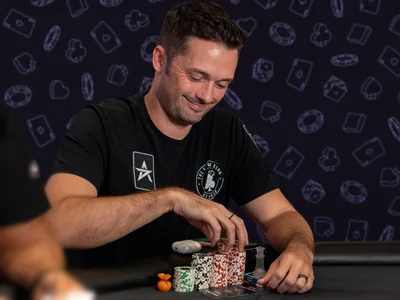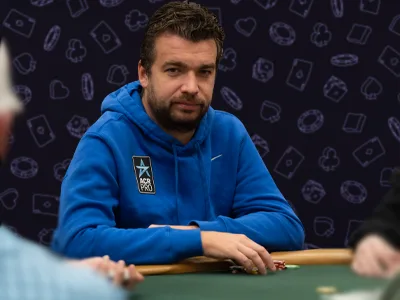By mastering bet sizing, you can exploit the smaller deck and and maintain control over the size of the pot Short Deck Hold’em, also known as Six-Plus Hold’em, is a variation of Texas Hold’em where the deck is reduced to 36 cards by removing the 2s, 3s, 4s, and 5s. This unique twist on the
Category: Intermediate
Mucking in Live Poker Tournaments: Strategies and Considerations
Mastering the art of mucking is about knowing when to let go and protect your chips Mucking in live poker tournaments is an essential concept that often goes overlooked, yet it plays a pivotal role in strategic decision-making. The term “mucking” refers to folding your cards face-down when deciding not to continue with a hand.
Adjusting Your Strategy for Multiway Pots in Short Deck
Prioritize strong hands, tighten your range and reduce bluff frequency in Short Deck poker In Short Deck Hold’em, multiway pots are more common than in regular Texas Hold’em due to increased hand equities and the absence of low-ranked cards (2s through 5s). Since players are more likely to connect with the board, it’s crucial to
Mucking as a Strategic Move in Texas Hold’em: How and When To Implement
Use mucking as a calculated move and it can quietly become part of a winning strategy In Texas Hold’em, mucking is often seen as a routine act—folding a hand you don’t want to show. But in certain moments, it can become a subtle but effective part of a larger strategy. Knowing when and how to
Understanding Texas Hold’em Cold Decks: What They Are and How They Affect Your Game
If you can take cold decks in stride, you’ll be better equipped to handle the swings of the game In Texas Hold’em, players sometimes refer to a “cold deck” when discussing hands that seem unusually unfair or tough to escape. While the term might sound like it involves cheating, in everyday poker conversation, it usually
The Importance of Reading Board Textures in Short Deck Hold’em
The more accurately you can evaluate the possibilities, the better your decisions will be In Short Deck Hold’em, also known as 6+ Hold’em, reading board textures is even more critical than in traditional Texas Hold’em. With the 2s through 5s removed from the deck, hand values shift, and players need to adjust how they interpret
How Small Pocket Pairs Fit Into a Larger Texas Hold’em Strategy
Used judiciously, small pocket pairs can produce huge profits without taking much risk Small pocket pairs—deuces through sixes—are not necessarily fearsome on the surface, but they can be an excellent part of a good Texas Hold’em strategy if used properly. These are not about brute force; they’re about timing, finesse, and long-term value. The greatest
Signs Your Opponents Fear Your Small Pocket Pair in Texas Hold’em
While small pocket pairs aren’t always easy to play, knowing how others perceive them can give you an advantage In Texas Hold’em, small pocket pairs like 2s through 6s often fly under the radar, but in the right hands, they can become powerful tools. While they may not seem threatening on the surface, there are
Strategic Comparisons Between Short Deck and Pot-Limit Omaha
Both reward creativity, but mastering each requires adapting to unique structures and tendencies Short Deck (also known as 6+ Hold’em) and Pot-Limit Omaha (PLO) are two popular poker variants that offer fast-paced action and deep strategic elements. While both games reward aggressive play and big hands, players’ approaches to them can be very different due
Texas Hold’em Small Pocket Pair Play Against Aggressive Players
Patience and position are your biggest allies when holding small pocket pairs Facing aggressive players in Texas Hold’em with a small pocket pair—such as twos through sixes—can be tricky. These hands have potential but can also be tough to manage when the action gets heavy early in the hand. Knowing when to hold on and
Effective Payoff Strategies With Made Hands in Pot-Limit Omaha
PLO rewards players who think ahead and don’t automatically stack off with strong but beatable hands Paying off opponents with made hands in Pot-Limit Omaha (PLO) can be a tricky balancing act. The game’s structure and four-hole-card format create bigger pots and more dynamic boards than Texas Hold’em, which means even strong hands can quickly
Bankroll Management for Short Deck Hold’em Players
Create a system that gives you the best chance to capitalize on profitable opportunities Short Deck Hold’em is an exciting variation of traditional Texas Hold’em that uses a 36-card deck, removing all the cards ranked two through five. This change significantly alters the dynamics of the game, leading to bigger pots and more frequent action.














